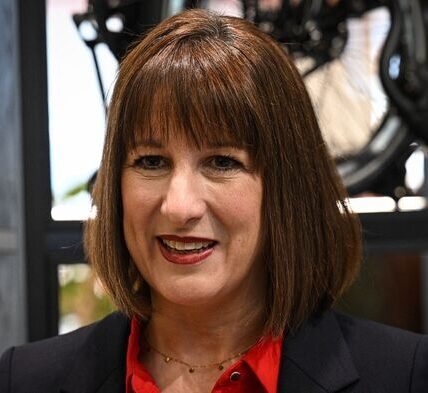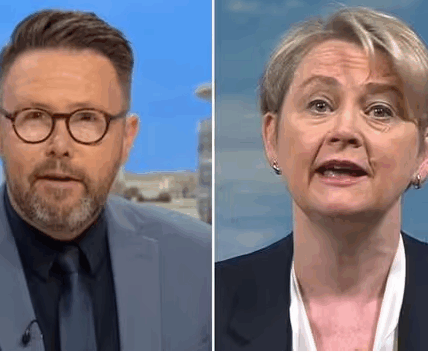EXCLUSIVE: The 96-year-old said the inheritance tax hike will force people to sell their farms, sacrificing years of knowledge and increasing food shortage risks.
One of the UK’s oldest farmers, who still works the land on his historic family smallhold, has warned that the Labour government is “the worst thing to happen to farming” in his lifetime. Russell Ling, 96, began working full-time on Grange Farm, in the rural East Suffolk village of Otley in late 1945, carrying on the tradition established by his grandfather, who bought the site in 1900.
Today, his limited mobility constrains him to cultivating the field on his tractor and boxing eggs from the arable farm’s 250 laying hens every morning. Tight financial margins have made it a very small-scale operation – just Russell and his son Anthony, 59, who does the majority of work and assumed main ownership around 30 years ago.
Russell has lived an impressive life by any account – he served on his local council for 72 years and will receive a British Empire Medal for service to the community in December. But he has also lived through incredible change in the farming sector, most notably the transition from horse to tractor power in the mid-twentieth century. He even remembers watching his father struggle to compete with foreign grain imports in the 1920s and 30s and during the rationing of the Second World War. It’s not lightly, then, that he describes the challenges currently facing the sector as “the worst thing to happen to farming” in his lifetime.

Russell’s father Cecil also dedicated his life to farming, pictured at the Suffolk Show in the ’70s (Image: Humphrey Nemar)
The Government will introduce a 20% inheritance tax on agricultural assets worth over £1 million in April 2026 – a cost-cutting measure that immediately faced huge backlash. The Daily Express’s Save Britain’s Family Farms campaign has led the charge against the changes, which could financially cripple farmers hoping to pass land onto their children.
“Once you start selling off farmland, you lose people like us – who’ve been farming all our lives, who know every inch of every field and have it in our blood,” Russell said. “It’s clear that the Government just wants to get as much money as they can from wherever possible. The trouble is, none of them have any sense.
“Unless British farming is protected, there will be food shortages,” he added. “We can’t keep going. Rachel Reeves should be taxing corporations, not small farms like us, but she doesn’t want to listen to anybody. There are other issues – climate change means people can’t grow what they used to, and that’s only going to get worse. But if farms have to close and lose their land, we’ll be even less capable of dealing with it.
“I’ve probably seen the biggest changes to farming in history throughout my life. In the last 70 years there’s been more change than in the last 700. But it’s a very worrying place that we’re in now.”

Russell and Anthony don’t employ anyone on Grange Farm – the costs ‘wouldn’t make financial sense’ (Image: Humphrey Nemar)
“At this precise stage, it won’t affect us because dad handed the farm over to me years ago,” Anthony said. “I’m not quite at the point where I have to think about passing it on yet, but I’ll have to in the not too distant future. All I can hope is that this crowd gets out of power quickly and they’re replaced by someone who has half a brain.”
Both father and son feel particularly strongly about the misconception that the majority of farmers are wealthy because of the value of their assets – an argument that has fuelled the scant support for Labour’s cash-grab.
“There’s a complete lack of understanding about the reality of farming,” Anthony explained. “At no point, through the four generations of our family who have farmed here, has any money passed hands. It was bought in 1900 for £10 an acre. It’s obviously increased in value since then, but we never see the financial benefit of it – that’s incidental to what we do. It’s completely irrelevant.”
They’re also in two minds about Jeremy Clarkson, whose series Clarkson’s Farm has helped to shine a light on the sector’s struggles, but who is also a less than ideal spokesperson for the inheritance tax scheme, being a wealthy landowner who once joked about buying his Oxfordshire farm to sidestep the taxman.
“I haven’t seen the newest series, but he’s done a lot of good for farming,” Russell said. “Admitting that he bought his farm to dodge inheritance tax doesn’t fit with the narrative,” Anthony added. “But he’s shown how difficult it is. So many people, when the first series came out, said: ‘We had no idea’.”

At 96, Russell is one of the oldest farmers still working in the UK (Image: Humphrey Nemar)
Like many other small agricultural businesses, Grange Farm has diversified over the years to increase cash flow – with a small livery yard, a holiday let and a farm shop, operated on an honesty box policy, on the 160-acre site. “We would not survive as an arable farm alone,” Anthony said.
The Ling family’s relationship, not just with the land but with the community, speaks to the vital role farms play in their local area. As well as selling eggs, chicken feed, hay and straw, Russell and Anthony have pitched in to clear snow from the roads, offered up their trailers for rubbish clearing and provided straw seating for the village fete.
After seeing firsthand the demanding schedule and low financial incentives of farming, Anthony’s grown-up children have gravitated towards more lucrative careers, however, and he’s not confident that anyone else would be willing to go to the lengths he does for such little tangible reward. Labour’s pause of the sustainable farming incentive (SFI), which offered payments to farmers who made space for nature on their land, has made it an even less stable career choice.
“No one in their right mind would go into farming, purely from a financial standpoint,” he said. “With the inheritance tax change, and the SFI pause, there’s so much uncertainty. You can’t plan for the future. I don’t think we’ve been loud enough about the impact a lack of investment in farming will have, to be honest.
“By our nature, we don’t tend to complain too much. We have too much work to do! But maybe we just need to starve the country for a few weeks – that would make them sit up and think.”

Anthony is the fourth generation of the family to run the farm – but he also could be the last (Image: Humphrey Nemar)
The closure of Grange Farm is a distinct possibility, although Anthony’s children would “like it to be kept in the family”. While the Lings’ history in East Suffolk will be memorialised in a series of memoirs Russell is writing in his spare time, the livelihood that has been a way of life to him since he was 16 could be under existential threat. It’s a sad thought, but not one he wants to dwell on for long. “It keeps me busy,” he said. “I like doing it. What else am I going to do? Sit around here all day?”
Since last year’s budget, farmers, agricultural organisations, MPs and over a quarter of a million members of the British public have called on Labour to stop the family farm tax.
Tom Bradshaw, President of the National Farmers’ Union, said: “At the heart of this battle are the elderly farmers who have devoted their entire lives to growing food for the country and supporting their rural communities. They should not become collateral damage.
“To see them face such uncertainty, knowing the legacy they and their families have worked hard for and grown could be ripped away by this tax, is heartbreaking. I cannot begin to imagine the fear many must be feeling now – their homes, their livelihoods and everything they’ve worked for is under threat.”
A Government spokesperson said: “Our commitment to farming and food security is steadfast. We’ve allocated a record £11.8 billion to sustainable farming and have appointed former NFU president Baroness Minette Batters to recommend new reforms to boost farmers’ profits.
“Most estates claiming Agricultural and Business Property Reliefs will be unaffected by the changes. The latest data shows that 40% of Agricultural Property Relief – worth £219 million – was directed to just 117 estates. The money raised will go towards public services we all rely on every day instead.”


